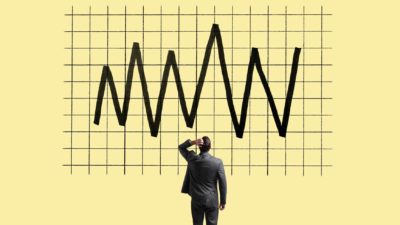2020 will be remembered for a lot of things.
COVID-19, mostly. And the bush fires that ravaged the country in January and February.
It's been a helluva year.
2020 will also be remembered as the year the RBA's official cash rate hit 0.1%.
It's not zero. But it might as well be.
Yes, it makes mortgages cheaper. And business loans.
(Not credit cards, though. How good is competition, huh?).
You know the other thing it keeps low? The interest rate on your saving.
Then again, can we really call 0% an interest rate at all?
Whenever the RBA's rates decisions are made, attention turns instantly to the impact on those with a mortgage.
I guess that's logical, but it ignores the fact that the majority of Australians don't have one.
We're split into three roughly equal groups – those who have a mortgage, those who rent, and those who own their homes outright.
So while the attention is on the borrowers, what happens to the poor bloody savers when rates are near zero?
They get dudded.
Not deliberately. And not (at least, arguably) unfairly.
But they're the collateral damage in the fight to keep the economy growing.
Unless you have millions (and millions) in the bank, you simply can't pay the bills using the interest you get on cash in the bank.
Either you're digging (deep) into your capital, or you have to cut back. Hard.
Or, there are reverse mortgages, which eat into the equity in your home.
Talk about three tough options.
So what do you do?
It mightn't surprise you to hear this from me, but I think the answer is shares.
In particular, dividend shares.
Why?
Well, the yields are much higher (sometimes 5-10 times higher!) than cash in the bank.
They often also come with valuable franking credits attached.
And, while shares as an asset class are risky, a well-chosen portfolio and a long-term mindset can meaningfully mitigate much (but not all) of that risk.
See, shares have, over time, delivered much better returns than cash.
Yes, with a lot more volatility.
And yes, with a big variability in individual company outcomes.
But managed well – diversified, using a cash cushion, and having a long-term mindset – I think shares can be a very, very effective alternative to cash.
Which, I think, is somewhat understating it.
More directly, I think you have a very good chance of being able to fund retirement expenses while preserving (and probably growing) your capital, using shares, in a way you simply can't with an equivalent cash pile.
There's no need for a fancy trading strategy using options or other derivatives, either!
(And don't get me started on those 'high interest, paid monthly' products that are being flogged in the papers these days. If it looks too good to be true…)
I know for some of you, the idea of abandoning savings for what you might see as 'risky' shares is anathema. If you've never invested in shares – or used them for income – I don't blame you.
It's like you have a gun to your head, and you're being forced to choose between less interest and more risk.
Actually, it's not like that, at all. It is exactly that.
Now, as I said, it needs to be a well-managed portfolio. It needs to be diversified. You need to know what you're doing. And you need to have a long-term mindset and be prepared for volatility.
But, especially given the alternative is paltry, I reckon that's something that's worth trying to get comfortable with.








